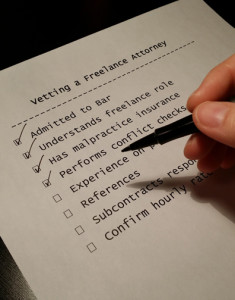
Vetting a Freelance Lawyer: Questions to Ask, Answers to Expect
 Whether you’re searching for freelance help on your own, or interviewing candidates recommended by a matchmaker, these questions may reveal whether a freelancer is a good fit for your project.
Whether you’re searching for freelance help on your own, or interviewing candidates recommended by a matchmaker, these questions may reveal whether a freelancer is a good fit for your project.
1. Where are you admitted as an attorney?
If you call yourself a freelance attorney, you should be an attorney. That means J.D., bar pass, admission to a state bar, no current suspensions, keeping up with CLE requirements, and following ethical obligations. These should be straightforward questions to answer (and verify); if you hear discomfort or evasion, or if anything doesn’t check out, pass.
2. Do you freelance exclusively?
Some do, some don’t. If the attorney is also a sole practitioner, consider whether you’re marketing to the same client base. Freelance attorneys understand stealing clients is a no-no, and are comfortable working in the background without direct client contact.
3. Do you have malpractice insurance?
Some do, some don’t. If they don’t, ask your carrier about how to ensure coverage.
4. Do you check for conflicts?
One right answer: Yes.
5. How long have you been freelancing?
Listen to how they talk about their work; it will give you a good sense of their experience, maturity, and judgment, all of which hint at how much supervision will be needed.
6. What kinds of projects have you worked on?
You’re listening for relevant experience, enthusiasm, and discretion. The freelancer should be able to convey clearly what they did, while protecting the identities and confidential information of everyone involved. They should also be able to give you references.
7. Do you ever subcontract tasks to others?
Some do, some don’t; it may depend on the project. If they do, they should be comfortable talking in general, hypothetical terms about when, why, how, and to whom. If you don’t get the sense confidentiality will be protected, conflicts checked, and tasks adequately supervised, pass.
8. What do you charge?
If you’re asking for an hourly rate, expect to hear a number in the ballpark of what a client would be willing to pay a slightly-less-experienced solo practitioner, or a senior paralegal at a large firm.
Bottom line: Freelancers are attorneys in the business of working for other attorneys. A freelancer who welcomes these questions, and can answer them appropriately, is likely to be responsive to your needs.
Freelancers, what are some other good questions to ask? Hiring attorneys, what else would you want to know?














Leave a Reply